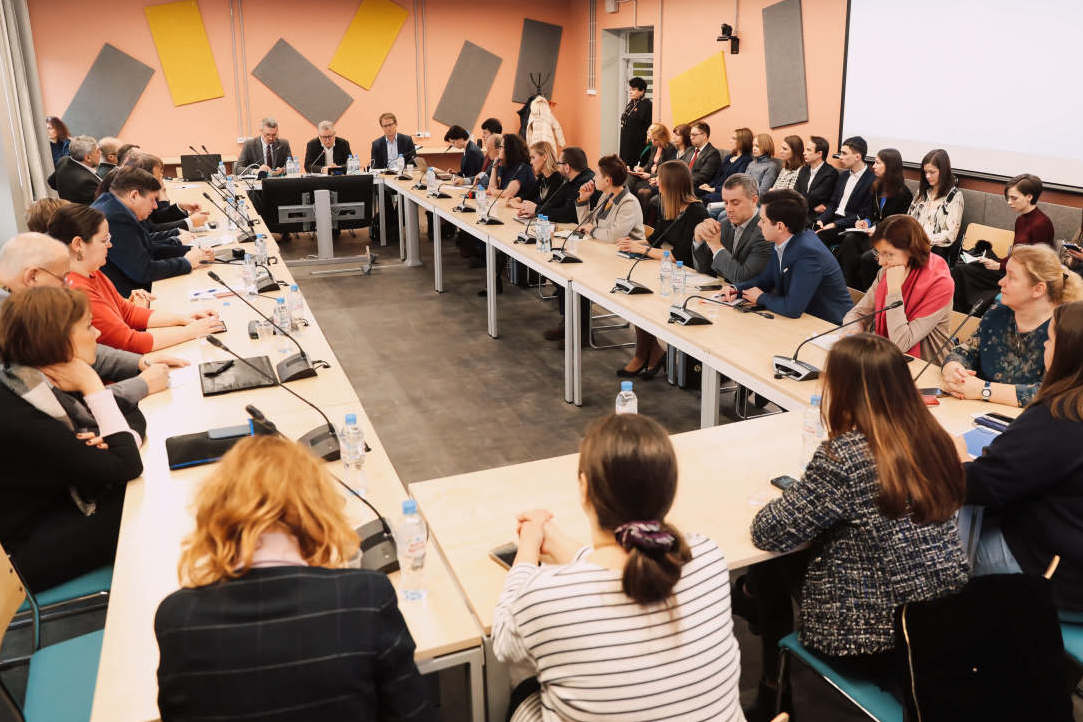Rector Yaroslav Kuzminov Meets with Faculty and Students at HSE – St. Petersburg

On January 30, Yaroslav Kuzminov held meetings with students and teachers of HSE University’s St. Petersburg campus. Below is a summary of the main points that the rector discussed.
Regional University Development
One of the tasks of HSE University in the coming years will be to help universities in Russia’s regions beyond its two largest cities. ‘A country cannot develop if all of its ambitious and intelligent people who are willing to invest in themselves leave their home regions and move to Moscow,’ Mr Kuzminov said.
To rectify the situation, HSE University has launched a support programme for regional universities: teachers, researchers, and administrative staff from other universities will have the opportunity to complete lengthy internships in Moscow and see firsthand how the university works.
HSE is already implementing a Russian post-doc programme, and it will soon be creating joint research centres with regional universities.
Transition to Project-Oriented Education
Rector Kuzminov announced that HSE will move away from its image among students as a ‘big educational machine,’ and a roadmap for changes to the Moscow campus will be announced in the near future. These changes will include structural changes to the university’s faculties: instead of departments, academic-project and academic-research laboratories and groups will be created. Unlike traditional departments, these labs and groups will have a high level of student involvement.
Each project that is being implemented at HSE University aims to have levels of student involvement that are 2-3 times higher than current levels. The University plans to achieve this goal in the next 5 years.
‘We need to build a system in which newly enrolled students do not simply scratch the surface of their areas of study, but get directly involved in it,’ the rector said.
Incentives for the Research and Teaching Community
In his discussions with faculty and students, Yaroslav Kuzminov focused on two innovations.
Firstly, contracts and academic bonuses will be extended at HSE. Academic bonuses will now last up to 5 years.
‘The time for this has come. Most of our colleagues have reached a point in their scholarly careers where they do not need constant supervision and stimulation,’ the rector explained.
Secondly, a project to enable early staffing of HSE research teams will be undertaken. At present, the University is ‘losing’ its strongest bachelor’s graduates to graduate schools abroad or Russian business.
Therefore, under the new project, undergraduate students who show promise in academic research will be encouraged to pursue a new research-focused master’s degree track designed specifically for them. Students will be offered a master’s position at the corresponding doctoral school, and their curriculum will centre on their specific area of research. These students will also receive a monthly scholarship of 40,000-50,000 rubles (at the Moscow campus).
Protecting Student and Staff Rights
HSE University will defend the rights of students and employees unfairly accused of crimes. ‘If we feel that someone is accused unfairly, we will help this person,’ the rector said when answering a question from a St. Petersburg campus student. ‘I believe that not only the rector should do this, but all students and staff. This is what distinguishes the HSE community.’
Student Media Support
HSE will continue to support student media. A media incubator will be established, and it will be staffed by eminent journalists.
Rector Kuzminov explained the University’s new rules regarding student media. ‘HSE will provide you with support if the University supports your concept. Your Charter and your editor-in-chief or editorial board will be approved, and you will then adhere to an independent editorial policy, which HSE will protect until you go beyond your mandate that was established by the Academic Council,’ he said.
Media who do not want to work this way can register as independent media.
Scholarships and Extracurricular Activity Support
The rector had negative things to say about HSE’s existing scholarship system. In his opinion, scholarships should promote social mobility by helping students from low-income families gain access to higher education.
‘For academic achievements, a student should receive grants or a research assistant salary,’ Rector Kuzminov said. ‘In other words, they should earn their money.’

